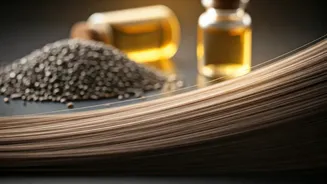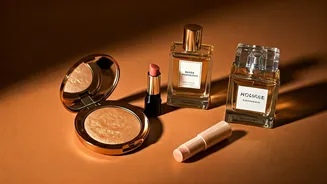Omega-3's Hair Power
Omega-3 fatty acids are essential nutrients, meaning our bodies can't produce them on their own; we must obtain them through diet or supplementation. These
fatty acids are crucial for overall health, and their benefits extend to hair. They nourish the scalp, reduce inflammation, and improve blood circulation to hair follicles. This enhanced blood flow delivers essential nutrients, leading to stronger, more resilient hair strands. Regular intake of omega-3s can combat dryness, breakage, and dullness, ultimately promoting thicker, shinier, and healthier hair. The key is their ability to penetrate the hair shaft, providing moisture and elasticity, making hair less prone to damage. Therefore, incorporating omega-3 into your diet becomes a simple yet powerful step towards achieving the hair of your dreams.
Fish Oil's Hair Advantage
Fish oil is a well-known source of omega-3 fatty acids, particularly EPA (eicosapentaenoic acid) and DHA (docosahexaenoic acid). These fatty acids offer a direct pathway to improving hair health. EPA helps reduce inflammation in the scalp, which often contributes to hair loss and hinders hair growth. A reduction in inflammation can create a healthier environment for hair follicles, allowing them to function optimally. DHA is a structural component of cell membranes, providing support to the scalp and enhancing hair's natural shine. Numerous studies support the effectiveness of fish oil in promoting hair growth and reducing hair thinning. The body's ability to efficiently utilize these fatty acids from fish oil makes it a readily available option for hair care. To harness the full benefits, one can consider consuming fish oil supplements or incorporating fatty fish like salmon, mackerel, and sardines into their regular diet. Remember that consistent intake is critical for seeing visible results.
Chia Seed Oil Benefits
Chia seed oil also provides a plant-based source of omega-3 fatty acids, primarily ALA (alpha-linolenic acid). ALA is converted into EPA and DHA, making it a valuable alternative for those who may prefer a vegetarian or vegan source of omega-3s. While ALA needs conversion within the body, it still contributes significantly to hair health. Chia seed oil provides similar benefits to fish oil, but there are certain distinctions. The antioxidants present in chia seed oil can protect hair from environmental damage. It works against free radicals that can weaken hair and lead to premature aging. The minerals in chia seed oil also help nourish hair follicles, leading to stronger and more vibrant hair. The benefits of chia seed oil for hair include its ability to moisturize, boost shine, and improve the overall texture of hair. Consistent use of chia seed oil, either topically or through supplements, can provide notable improvements in hair health over time.
Comparing the Oils
When comparing fish oil and chia seed oil for hair growth, several factors come into play. Fish oil has the advantage of containing EPA and DHA directly, offering immediate access to these beneficial fatty acids. This means quicker absorption and potentially faster results. Conversely, chia seed oil requires conversion of ALA to EPA and DHA. The efficiency of this conversion varies from person to person. However, chia seed oil offers a valuable alternative for those wanting a plant-based source. Both oils offer essential nutrients, and the best choice often depends on individual dietary preferences and needs. Both can equally contribute to healthier hair. Furthermore, consider the other nutrients and antioxidants present in each oil, as they contribute to overall hair health. Ultimately, the best option is the one that fits your lifestyle and dietary needs while consistently providing the necessary omega-3s. Consulting with a healthcare professional can help you determine the optimal choice for your individual hair care goals.
Omega-3 Integration Tips
Integrating omega-3 into your diet for hair health doesn't have to be complex. Start by including omega-3-rich foods in your meals regularly. Fatty fish, such as salmon, mackerel, and sardines, are excellent choices. If you follow a plant-based diet, chia seeds, flaxseeds, and walnuts are excellent alternatives. Supplements can also be used if your dietary intake is not enough. Fish oil and chia seed oil supplements are widely available. When choosing a supplement, look for quality brands that ensure purity and high concentrations of omega-3s. Additionally, consider how these oils are used topically. You can apply these oils directly to your hair and scalp as a conditioning treatment. This helps moisturize the hair, reduce dryness, and enhance shine. Regardless of the method you choose, the key is consistency. Make omega-3 a consistent element of your diet or hair care routine to experience its full benefits. Over time, you should start seeing significant improvements in your hair's overall health and appearance.














